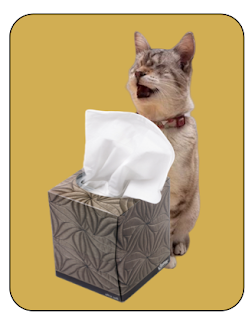Cats and the Common Cold
It's THAT time of year again - the one that brings coughs, colds and runny noses! This is true for us humans but what does a runny nose mean for your cat? Are they seasonal for them, too? Is it normal? Do they have allergies?
Vets will tell you that runny noses in cats is NOT normal. They can be caused by lots of different things, including allergies or, more likely, infections. The top two causes of upper respiratory infections (URI) in cats are the rhinotracheitis virus and calicivirus. Feline viral rhinotracheitis is an upper respiratory or pulmonary infection of cats caused by Felid alphaherpesvirus 1, of the family Herpesviridae.
Other causes of a runny nose might be a nasal tumor or even a abscessed tooth. For these conditions you might notice swelling or see discharge only coming from one side of the cat's nose.
So, if a URI is the usual cause for runny noses, how do you watch out for it? If you observe any of these things in your cat, please get to your vet immediately: clear discharge coming from your cat's nose; yellow or green looking nasal discharge; sneezing; lethargy; appetite loss; inflamed eyes; fever; or a hoarse or quiet meow.
The most dangerous development of a URI is a corneal ulcer, which is related to the herpesvirus. From the BCR cats, you know that an untreated URI can damage a cat's eyes to the point where they have to be removed (like Peanut, Charity and Misty, who arrived at BCR in this condition and we were able to treat them.) If a cat has the calicivirus infection, they may also get mouth and tongue ulcers, which are very painful and can cause a cat to drool and to stop eating.
When you get your cat to the vet and a URI as been diagnosed, your cat may be treated with antibiotics and, just like humans, he'll probably recover in anywhere from five to 14 days. Really severe cases might require additional treatments like eye drops or ointments for corneal ulcers or an appetite stimulant to encourage your cat to eat.
There is a vaccine for cats that impacts several viruses: the FVRCP (for feline viral rhinotracheitis, calici virus and panleukopenia). The panleukopenia virus causes a severe viral diarrhea. As with all regular vaccines, it's very important to keep them up to date.
Once a cat gets a URI, they carry the virus the rest of their lives. Usually it stays dormant but can flare up if a cat goes through some stress that weakens his immune system. Some cats never get another one and some get one every year. Every cat is different.
Bottom line - and you've heard this before - keep a close eye on your cat's health and if you see any signs or are the slightest bit concerned that your cat may be getting a URI, go to the vet immediately. That's the best way to beat a URI before it does long-term harm to your cat. Be proactive!
CLICK HERE to read more on URIs.
CLICK HERE for specifics on kitty colds.




Comments
Post a Comment